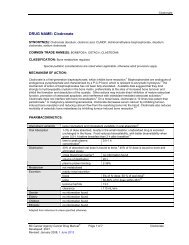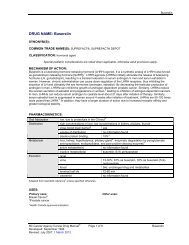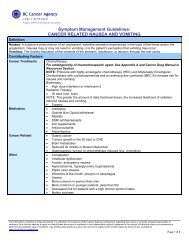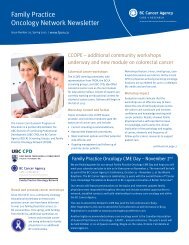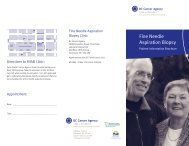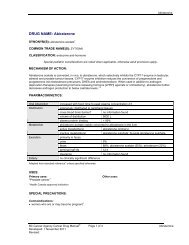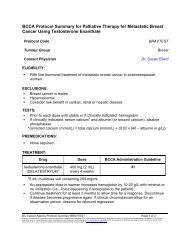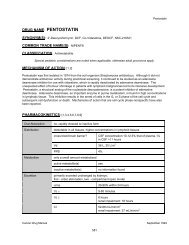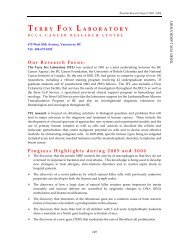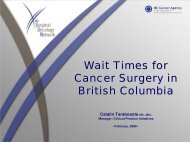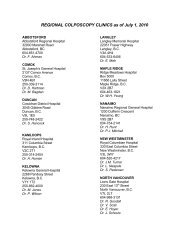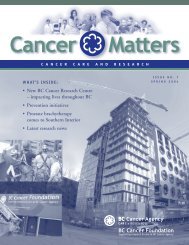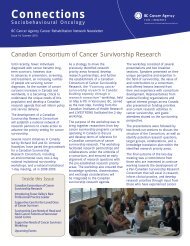For the Patient: FEC - BC Cancer Agency
For the Patient: FEC - BC Cancer Agency
For the Patient: FEC - BC Cancer Agency
You also want an ePaper? Increase the reach of your titles
YUMPU automatically turns print PDFs into web optimized ePapers that Google loves.
<strong>For</strong> <strong>the</strong> <strong>Patient</strong>: <strong>FEC</strong><br />
O<strong>the</strong>r names: BRAJ<strong>FEC</strong>, <strong>FEC</strong>100<br />
F Fluorouracil<br />
E Epirubicin<br />
C Cyclophosphamide<br />
Uses:<br />
• <strong>FEC</strong> is a drug treatment given after breast cancer surgery (called adjuvant chemo<strong>the</strong>rapy)<br />
in <strong>the</strong> hope of destroying breast cancer cells that may have spread to o<strong>the</strong>r parts of your<br />
body. This treatment may reduce <strong>the</strong> chance of your breast cancer coming back and may<br />
improve your overall survival or chance of a cure.<br />
• <strong>FEC</strong> is offered to women who have had breast cancer that has spread to at least 1 lymph<br />
node and are up to age 60 years. <strong>FEC</strong> is not used for women with serious heart problems.<br />
Treatment Plan:<br />
• Your treatment plan consists of 6 chemo<strong>the</strong>rapy cycles. Each cycle lasts 3 weeks (= 21<br />
days). <strong>For</strong> each cycle, you will have an injection in <strong>the</strong> vein (IV) on <strong>the</strong> day following your<br />
doctor’s appointment. You will return in 3 weeks for <strong>the</strong> next cycle.<br />
• The IV treatment takes about 60 minutes. However, on day 1 of each cycle, you may need<br />
to spend some time before you chemo appointment for a blood test.<br />
• Drugs:<br />
• Three drugs (fluorouracil, epirubicin, and cyclophosphamide) are given as an IV<br />
injection in your arm on day 1 of each cycle.<br />
• You take anti-nausea pills to help prevent nausea and vomiting. The anti-nausea<br />
prescription is filled at your drugstore.<br />
• A blood test is done ei<strong>the</strong>r on <strong>the</strong> day of your doctor’s appointment or <strong>the</strong> day of your<br />
chemo<strong>the</strong>rapy. The dose and timing of your chemo<strong>the</strong>rapy may be changed based on your<br />
blood counts and/or o<strong>the</strong>r side effects.<br />
• If needed, radiation <strong>the</strong>rapy and/or tamoxifen start after your last chemo<strong>the</strong>rapy cycle is<br />
finished.<br />
British Columbia <strong>Cancer</strong> <strong>Agency</strong><br />
Developed: 1 March 2005<br />
<strong>FEC</strong><br />
1 of 4
Instructions:<br />
• Bring your anti-nausea drugs with you to take before each IV treatment. You also need to<br />
take your anti-nausea drugs at home. It is easier to prevent nausea than treat it once it has<br />
occurred, so follow directions closely.<br />
• Drink lots of fluids if possible (8-12 cups a day).<br />
• Call your cancer doctor immediately (day or night) at <strong>the</strong> first sign of any infection but<br />
especially if you have a fever over 38°C or 100°F.<br />
• Check with your doctor or pharmacist before you start taking any new drugs. O<strong>the</strong>r drugs<br />
such as cimetidine (Tagamet®), phenobarbital, phenytoin (Dilantin®), warfarin<br />
(Coumadin®), metronidazole (Flagyl®) and thiazide diuretics (“water pills”) may interact<br />
with <strong>FEC</strong>.<br />
• You may drink small amounts of alcohol, as it will not affect <strong>the</strong> safety or usefulness of your<br />
treatment.<br />
• Tell o<strong>the</strong>r doctors or dentists that you are being treated with <strong>FEC</strong> before you receive any<br />
treatment from <strong>the</strong>m.<br />
• Use birth control (but not birth control pills) if you could become pregnant. Do not breast<br />
feed.<br />
Serious Side Effects:<br />
Unexpected and unlikely side effects can occur with any drug treatment. The ones listed<br />
below are particularly important as <strong>the</strong>y are directly related to <strong>the</strong> common actions of <strong>the</strong><br />
drugs in your treatment plan. Leukemia and heart failure are more likely to occur after<br />
treatment is finished.<br />
• Infection: The number of white blood cells that help fight infections will be<br />
lowered by <strong>the</strong> treatment. Your blood count is expected to return to normal by day 1 of <strong>the</strong><br />
next cycle. If your white blood cell count becomes very low you could get a serious<br />
infection. The chance of a serious infection is around 3% with <strong>FEC</strong>. If you have a fever<br />
over 38°C or 100°F, call your cancer doctor immediately (24 hours a day) or go<br />
immediately to your nearest Hospital Emergency and tell <strong>the</strong> doctor you are on<br />
chemo<strong>the</strong>rapy.<br />
• Tissue injury: Epirubicin can cause tissue injury if it leaks out of <strong>the</strong> vein while it is<br />
being given. Report any sensation of burning or pain to your nurse immediately.<br />
• Early menopause: If you are still having menstrual periods, <strong>FEC</strong> may cause your ovaries<br />
to stop working, resulting in menopausal symptoms (such as hot flushes) and infertility.<br />
Your periods may stop. This may be permanent, especially if you are 40 years of age or<br />
older.<br />
• Leukemia: In <strong>the</strong> large French study of 496 women given <strong>FEC</strong>, two patients<br />
developed acute leukemia (blood cancer). It is possible that this was related to <strong>the</strong><br />
epirubicin in <strong>FEC</strong>. Although <strong>the</strong>re is a small risk of leukemia, <strong>the</strong> overall benefit in terms of<br />
reducing breast cancer recurrence and improving survival are thought to outweigh this risk.<br />
• Heart Failure: Rarely, epirubicin can have an effect on <strong>the</strong> heart in some patients<br />
causing failure of <strong>the</strong> heart’s pumping action which results in shortness of breath, fatigue<br />
and leg swelling. The heart failure rate was less than 2% in <strong>the</strong> large French study.<br />
British Columbia <strong>Cancer</strong> <strong>Agency</strong><br />
Developed: 1 March 2005<br />
<strong>FEC</strong><br />
2 of 4
Common Side Effects and Management:<br />
SIDE EF<strong>FEC</strong>T<br />
Nausea and vomiting can occur with<br />
this treatment and you will need to take<br />
anti-nausea drugs at <strong>the</strong> time of <strong>the</strong><br />
injections and on days 2 and 3 while at<br />
home.<br />
Weight gain may occur during treatment.<br />
Hair loss. Your hair will fall out 2-4<br />
weeks after treatment begins. Your scalp<br />
may feel tender. You may lose hair on<br />
your face and body. Your hair will grow<br />
back once your treatments are over and<br />
sometimes between treatments. The<br />
colour and texture of <strong>the</strong> new hair growth<br />
may be different.<br />
Mouth sores may occur a few days after<br />
treatment. Mouth sores can occur on <strong>the</strong><br />
tongue, gums, <strong>the</strong> sides of <strong>the</strong> mouth or<br />
in <strong>the</strong> throat.<br />
Fatigue is common especially in <strong>the</strong> first<br />
week after your treatment. As <strong>the</strong><br />
number of treatment cycles increase<br />
fatigue may get worse.<br />
MANAGEMENT<br />
You will be given a prescription for anti-nausea<br />
drugs to take before your IV treatment and<br />
afterwards at home.<br />
• It is easier to prevent nausea than treat it<br />
once it has occurred, so follow directions<br />
closely.<br />
• Refer to <strong>the</strong> following pamphlets: <strong>For</strong> <strong>the</strong><br />
<strong>Patient</strong>: Managing Nausea; Chemo<strong>the</strong>rapy &<br />
You; Food choices to help control nausea*.<br />
Do not try to lose weight during treatment.<br />
• If you are feeling well, eat a varied and<br />
balanced diet and keep active.<br />
• Choose lower fat foods if you are eating<br />
frequently to relieve nausea.<br />
• Ask to see a nutritionist or refer to A nutrition<br />
guide for women with breast cancer*.<br />
• Shaving <strong>the</strong> head may be more comfortable.<br />
• Avoid hair spray, bleaches, dyes and perms.<br />
• Apply mineral oil to your scalp to reduce<br />
itching.<br />
• If you lose your eyelashes and eyebrows,<br />
protect your eyes from dust and grit with a<br />
broad-rimmed hat and glasses.<br />
• Consider cutting your hair short before it falls<br />
out<br />
• Ask your nurse about information on wigs and<br />
head coverings.<br />
• Brush your teeth gently after eating and at<br />
bedtime with a very soft toothbrush. If your<br />
gums bleed, use gauze instead of a brush.<br />
Use baking soda instead of toothpaste.<br />
• Try baking soda mouth rinses (using 1/4 tsp<br />
baking soda in 1 cup warm water)and rinse<br />
several times a day. Try ideas in Easy to<br />
chew, easy to swallow food ideas*.<br />
• Tell your doctor about a sore mouth, as your<br />
chemo<strong>the</strong>rapy doses may need to be<br />
decreased if mouth sores are severe.<br />
• Your energy level will improve with time after<br />
treatment is completed.<br />
• Refer to pamphlet “Yes I can: How people<br />
with cancer can handle fatigue”**.<br />
British Columbia <strong>Cancer</strong> <strong>Agency</strong><br />
Developed: 1 March 2005<br />
<strong>FEC</strong><br />
3 of 4
SIDE EF<strong>FEC</strong>T<br />
Injection site pain or tenderness may<br />
occur where <strong>the</strong> needle was placed and it<br />
may extend up <strong>the</strong> arm.<br />
MANAGEMENT<br />
• Apply cool or warm compresses or soak in<br />
cool or warm water for 15-20 minutes several<br />
times a day.<br />
Irritated and watery eyes can occur. • Use of artificial tears may help your eyes.<br />
You may notice a metallic taste in your<br />
mouth.<br />
Burning on urination. The drugs can<br />
cause an irritation of <strong>the</strong> bladder that<br />
results in burning on urination and/or<br />
frequency of urination.<br />
Pain affecting joints of <strong>the</strong> hands,<br />
knees and feet can occur following<br />
chemo<strong>the</strong>rapy.<br />
Your skin may sunburn easily during<br />
treatment with fluorouracil.<br />
*available through your nurse or nutritionist<br />
** available through your nurse<br />
• Chew gum, suck on a candy or have a strong<br />
flavoured drink if <strong>the</strong> taste is bo<strong>the</strong>rsome.<br />
• Try baking soda mouth rinses (using 1/4 tsp<br />
baking soda in 1 cup water) before or<br />
between meals<br />
• Refer to “Coping with taste changes”*.<br />
• Drink more fluids to keep <strong>the</strong> urine dilute and<br />
empty your bladder often.<br />
• Your family doctor can help you to manage<br />
symptoms of joint pain.<br />
To help prevent sunburn:<br />
• Avoid direct sunlight.<br />
• Wear a hat, long sleeves and long pants or<br />
skirt outside on sunny days.<br />
• Apply a sun block lotion with a SPF (sun<br />
protection factor) of at least 15.<br />
If you experience symptoms or changes in your body that have not been described<br />
above but worry you, or if any symptoms are severe, contact<br />
_______________________________ at telephone number ___________________<br />
British Columbia <strong>Cancer</strong> <strong>Agency</strong><br />
Developed: 1 March 2005<br />
<strong>FEC</strong><br />
4 of 4



